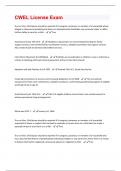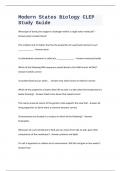CWEL License Exam
True or false: Child abuse should be reported if A caregiver, paramour or member of a household whose
alleged or observed mental/physical illness or developmental disabilities may seriously impair or affect
his/her ability to care for a child. - True
Social Security Act Title IV-B - Establishes requirement to receive federal funding for family
support services, time-limited family reunification services, adoption promotion and support services.
Also creates funds for General child welfare services.
Inter-Ethnic Placement Act (IEPAp24) - Prohibits any consideration is children's race or ethnicity as
a factor in deciding which permemant placement will be in their best interest.
Adoption and Safe Families Act of 1997 - Amends Title IV-E, Social Security Act.
Fostering Connections to Success and Increasing Adoptions Act of 2008 - This act extends
assistance for foster care maintenance, adoption assistance, and kinship guardianship program to eligible
youth age 18 up to age 21.
Social Security Act Tittle IV-E - Title IV-E eligible children receive foster care reimbursement to
achieve permanent living arrangements.
When was DCFS ? - January 1st, 1964
True or false: Child abuse should be reported if A caregiver, paramour or member of a household
suspected of abuse or neglect that resulted in moderate to severe harm to a child who has made a
plausible threat of such harm to a child? - True
True or false: Child abuse should be reported if A caregiver, paramour or member of a household who
has a documented history of perpetuating child abuse/neglect or any person for whom there is a reason
to believe that he/she neglected a previously abused or neglected a child. - True
,True or false: Child abuse should be reported if child abuse is suspected and circumstances suggest that
child safety may be an immediate concern. - True
True or false: Child abuse should be reported if A caregiver, paramour or member of a household is
hiding the child, refuses access, or there is some indication that a caregiver may flee with the child. -
True
True or false: Child abuse should be reported if the child is fearful of his/her home situation because of
the people living in or frequenting in the home. - True
True or false: Child abuse should be reported if A caregiver, paramour or member of a household
describes or acts towards the child constantly in a predominantly negative manner. - True
Define Vicarious Trauma: - An occupational hazard for those working with traumatized persons
and trauma material. It is the process of change that happens because you care about other people who
have been hurt, and are responsible to help them.
True or false: Child abuse should be reported if A caregiver, paramour or member of a household has
dangerously unrealistic expectations for the child. - True
True or false: Child abuse should be reported if A caregiver, paramour or member of a household
expresses credible fear that he/she may cause moderate to severe harm to a child. - True
True or false: Child abuse should be reported if A caregiver, paramour or member of a household has
not, will not, or is unable to provide sufficient supervision to protect child from potentially moderate to
severe harm. - True
True or false: Child abuse should be reported if A caregiver, paramour or member of a household refuses
to or is unable to meet a child medical or mental healthcare needs and such lack of care may result in
moderate to severe harm to the child. - True
,True or false: Child abuse should be reported if A caregiver, paramour or member of a household refuses
or is unable to meet the child's need for food, clothing, shelter, and/or appropriate environmental living
conditions. - True
True or false: Child abuse should be reported if A caregiver, paramour or member of a household whose
alleged or observed substance abuse may seriously affect his/her ability to supervise, protect or care for
the child. - True
True or false: Child abuse should be reported if the presence of violence, including domestic violence
affects a caregivers ability to provide care for a child and/or protection of a child from moderate to sever
harm. - True
True or false: Child abuse should be reported if A caregiver, paramour or member of a household
engaged in or credibly alleged to be engaged in human trafficking. - True
Role of child welfare professional - To achieve those outcomes in a timely and effective manner.
Who needs a Child Welfare License? - Child Protection Investigators and Supervisors, Child
Welfare Specialists and Supervisor employed by DCFS.
What does Social Work Practice require? - Child safety, permanency, and well-being for children,
family, and parents.
What are the outcomes of all Child Welfare practice? - Permanency, safety, and the well-being of
1st Principle of Social Work: - Engaging in a supportive relationship and treating them with
positive regard.
2nd Principle of Social Work: - Building on clients' apparent strengths and motivations.
, 3rd Principle of Social Work: - Helping clients recognize their conditions,, decisions, and patterns
of behaviors and supporting them in the change process.
4th Principle of Social Work: - Consistency, honesty, and trustworthiness in the delivery of Child
Welfare services.
5th Principle of Social Work: - Treating clients as individuals and families as unique units with
respect for individuals, groups, and cultural density.
6th Principle of Social Work: - Acceptance is demonstrated by treating parents as individuals and
families with dignity and positive regard.
7th Principle of Social Work: - Respecting families' rights to be involved in planning and decision-
making processes.
8th Principle of Social Work: - Maintaining a commitment to a high standard of personal and
professional conduct.
9th Principle of Social Work: - Clear expectations of the knowledge, skills, and values necessary for
child welfare professionals to capably serve children and families.
10th Principle of Social Work: - Training, supervision, and evaluation that enable and enhance the
ability of staff to perform competently and in accordance with these principles and expectations.
11th Principle of Social Work: - Timely decisions, based on the above set of principles that
establish conditions encouraging and affording a sense of permanency in children's lives while ensuring
their safety, health, and well-being.
1st Core Principle of Child Welfare Practices: - Serve as an agent of change.
2nd Core Principle of Child Welfare Practices: - Form a helping relationship with the child and
their family.





